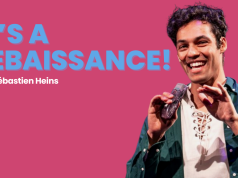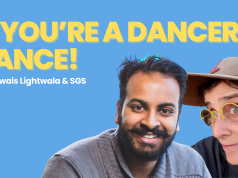My last thought:
“If you can picture yourself doing anything else, don’t go into theatre.”
I think this is such a damaging thing to say to our young people. It instills this nagging worry that maybe we don’t love our art enough, and maybe we don’t belong here.
So, I just want to say – To other young people who are just starting their careers: We do belong here, and all we have to focus on is if theatre is loving us back enough in return.
Thank you.
Choosing the Internet as a performance space might be risky – especially for political performance, and specifically for audiences. We know that it is so easy to be tracked, identified, and surveilled online. So what is the artist’s responsibility to their audiences?
For example, what servers do they have to connect to to view your performance, and do those servers keep logs? What country are those servers located in, and what could the consequences be if the public or a government found out that a specific individual viewed your performance?
You are watching a performance. How are you feeling, in general? Are you enjoying yourself?
I was thinking about that today – how I might not actually use that word. I’m readying, I’m calming, I’m focusing myself. I’m opening myself. But I don’t know that that’s enjoyment…
So go see a performance tonight. You might not enjoy yourself either.
I’m not a big fan of being called “diverse” – It’s just not a great word for individuals. Diversity as a concept can really only be applied to groups. And there’s some weird, mixed-race existential anxiety that it whips up in me.
So the next time you’re about to say the words “diverse artists”, just think for a second: Am I just trying to say “not-white artists”? If so, there might be some value in just saying what you mean.
Today I’m thinking about how arts workers are people first.
I recently had a chance to sit down with a few early-career artists and administrators from across the country, and mainly what we talked about was the uncertainty of the future that we face. For some of us, it was looking six months down the line and not knowing what would happen to us after our artistic associate position ends. And for all of us, we were thinking about: How do we sustain ourselves on the meagre salaries that maybe only the luckiest among us might be able to secure by the end of our careers?
I’m stuck on the idea of spectatorship in online performance. I’m really struck by the link I feel between my body and my identity vs. disembodiment and anonymity.
I’m trying to figure out what ethics or politics come into play when I see you, but you don’t see me – when you’re playing to an anonymous audience.
I’m listening to a real-time audio stream of the sound a tree makes falling in the forest. If you hear it too, did we share anything?
I heard that at every moment, bacteria are just leaping off of our bodies and into the environment. I think I’ve got a little piece of everyone I’ve ever sat beside in a theatre.
I ordered lunch through an app. I don’t usually order lunch, but today I did.
I walked into the restaurant and I saw a bag with my name on it so I grabbed it. I said a quick thank you, but too quiet and to no one in particular so no one looked up. Then I left.
Today I’m thinking about the ways the Internet makes my body invisible in the real world in the name of efficiency, and how in my brain there’s many reasons why I should be concerned about this. But in how I feel, I guess I don’t really mind.
Did you watch the Tonys?
Today’s thought is about the art we love and what happens, or how it feels, when we stop loving it.
These days I sit through a musical the same way I think Kevin Spacey does – with a polite smile that doesn’t reach my eyes.
Hey, it’s Dylan again. Thought #4 is about sharing, artistic labour, and money.
I’ll be among the first to advocate for more openness, more sharing of artistic works, the ability to build upon them… I think that if art is a public good it should be freely available.
However, I have to wonder if sharing freely in this way undervalues – devalues artistic labour in an industry that already has problems being undervalued socially and with actual dollars.
Hey, it’s Dylan with Thought #3.
As scrappy as theatres can be, we use a lot of technology, and most of it is proprietary. Other people build it, and theatres pay to use it.
I’ve been dreaming of a world where theatres will have the money to hire technical people to be on staff to collectively build and maintain the tools we need as an industry, and make them freely available for anyone’s use. So, that’s the idea – Let’s do it! I don’t know where we find the money, but let’s open source theatre technology.
Hey, it’s Dylan and this is my second thought.
Today I’m thinking about Semantic Versioning, so for example, the process that governs our move from version 1 to version 2. In software, this is a huge shift introducing backwards-incompatible changes that mean you can’t use that software in the same way.
We can re-invent Romeo & Juliet into version 2 and demand a fundamentally different engagement with that work, but the important question is: How do we get to version 3 from there, and how far can we go?
Hi, my name is Dylan On.
Today I’m thinking about artistic and cultural institutions and their subjectivity. Namely – do they have one?
Can institutions exist in a real way where they can bear responsibility, or do individuals like me simply speak them into existence?
I guess what I’m wrestling with is:
When institutions fail…does the buck stop with me?









